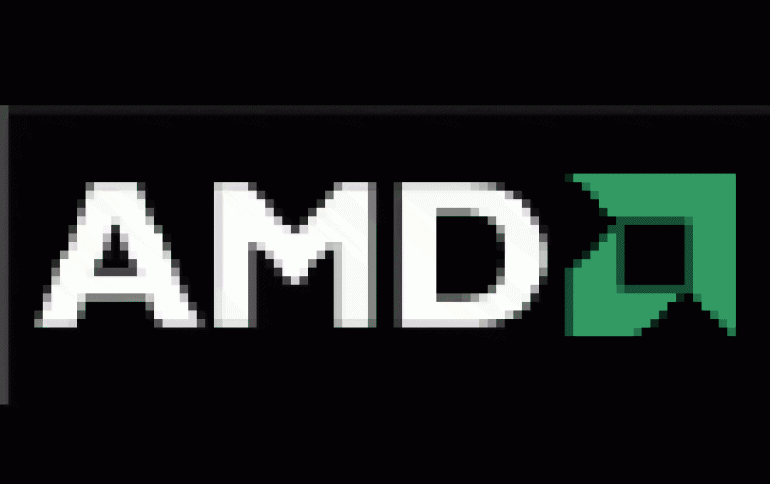
AMD Supports Fair Trade Commission of Japan's -- JFTC -- Decision to Stop Illegal Business Practices by Intel
Intel's Unlawful Business Practices in Japan Limit Consumers' Freedom to Choose Worldwide
AMD (NYSE:AMD) released the following statement today regarding the Fair Trade Commission of Japan's (JFTC) Recommendation to Intel Japan K.K. ("Intel") on its violation of Section 3 of Japan's Antimonopoly Act:
"The JFTC found that Intel illegally manipulated the market to exclude competition, hurting PC users around the world," said Thomas M. McCoy, AMD executive vice president, legal affairs and chief administrative officer. "Using market power illegally to limit innovation and, more importantly, consumers' freedom to choose, cannot be tolerated. We encourage governments around the globe to ensure that their markets are not being harmed as well."
McCoy continued, "The evidence of harm to consumers is obvious. By preventing PC manufacturers from using CPUs of their choice, Intel's misconduct deprived consumers worldwide of the freedom to purchase computers that best fit their needs. Efforts by an avowed monopolist to artificially set market shares to exclude competition clearly violates antitrust standards globally."
The JFTC has found that Intel has abused its monopoly power to exclude fair and open competition, thereby violating Section 3 of Japan's Antimonopoly Act. These findings reveal that Intel used illegal tactics to stop AMD's growing success and increasing market share, which reached 22% in 2002, by imposing limitations on Japanese PC manufacturers (which sell notebook and desktop computers to customers around the world).
The JFTC Recommendation is the culmination of an 11-month investigation that has established patterns of anti-consumer and anti-competitive behavior. The Commission found that, because of AMD's inroads into Intel's market share, Intel deliberately set out to artificially limit AMD by imposing conditions on five Japanese manufacturers that together represented 77% of all CPUs sold in Japan. Specifically, the JFTC found that:
-- One manufacturer was forced to agree to buy 100% of its CPUs from Intel; another manufacturer was forced to curtail its non-Intel purchases to 10% or less;
-- Intel separately conditioned rebates on the exclusive use of Intel CPUs throughout an entire series of computers sold under a single brand name in order to exclude AMD CPUs from distribution;
-- The mechanisms used to achieve these ends included rebates and marketing practices that includes the "Intel Inside" program and market development funds provided through Intel's corporate parent in the United States.
The Recommendation notes that Intel imposed these restrictions in direct response to AMD's growing market share from 2000-2002. The Recommendation also notes that as a result of this misconduct, the combined market share of AMD and a second, much smaller CPU company fell from 24% in 2002 to 11% in 2003.
The JFTC imposed a number of restrictions on Intel. Among them, it must notify its customers and educate its employees that it may no longer provide rebates and other funds to Japanese computer manufacturers on conditions that exclude competitors' CPUs.
The European Commission's investigation of Intel for anti-competitive business practices in the European market remains ongoing.
AMD's Position on Fair and Open Competition
AMD stands for fair and open competition and the value and variety competition delivers to consumers. Businesses and consumers should have the freedom to choose from a range of competitive products that come from continuous innovation on a level playing field where everybody plays by the rules. When market forces work, consumers have choice and everyone wins.
"The JFTC found that Intel illegally manipulated the market to exclude competition, hurting PC users around the world," said Thomas M. McCoy, AMD executive vice president, legal affairs and chief administrative officer. "Using market power illegally to limit innovation and, more importantly, consumers' freedom to choose, cannot be tolerated. We encourage governments around the globe to ensure that their markets are not being harmed as well."
McCoy continued, "The evidence of harm to consumers is obvious. By preventing PC manufacturers from using CPUs of their choice, Intel's misconduct deprived consumers worldwide of the freedom to purchase computers that best fit their needs. Efforts by an avowed monopolist to artificially set market shares to exclude competition clearly violates antitrust standards globally."
The JFTC has found that Intel has abused its monopoly power to exclude fair and open competition, thereby violating Section 3 of Japan's Antimonopoly Act. These findings reveal that Intel used illegal tactics to stop AMD's growing success and increasing market share, which reached 22% in 2002, by imposing limitations on Japanese PC manufacturers (which sell notebook and desktop computers to customers around the world).
The JFTC Recommendation is the culmination of an 11-month investigation that has established patterns of anti-consumer and anti-competitive behavior. The Commission found that, because of AMD's inroads into Intel's market share, Intel deliberately set out to artificially limit AMD by imposing conditions on five Japanese manufacturers that together represented 77% of all CPUs sold in Japan. Specifically, the JFTC found that:
-- One manufacturer was forced to agree to buy 100% of its CPUs from Intel; another manufacturer was forced to curtail its non-Intel purchases to 10% or less;
-- Intel separately conditioned rebates on the exclusive use of Intel CPUs throughout an entire series of computers sold under a single brand name in order to exclude AMD CPUs from distribution;
-- The mechanisms used to achieve these ends included rebates and marketing practices that includes the "Intel Inside" program and market development funds provided through Intel's corporate parent in the United States.
The Recommendation notes that Intel imposed these restrictions in direct response to AMD's growing market share from 2000-2002. The Recommendation also notes that as a result of this misconduct, the combined market share of AMD and a second, much smaller CPU company fell from 24% in 2002 to 11% in 2003.
The JFTC imposed a number of restrictions on Intel. Among them, it must notify its customers and educate its employees that it may no longer provide rebates and other funds to Japanese computer manufacturers on conditions that exclude competitors' CPUs.
The European Commission's investigation of Intel for anti-competitive business practices in the European market remains ongoing.
AMD's Position on Fair and Open Competition
AMD stands for fair and open competition and the value and variety competition delivers to consumers. Businesses and consumers should have the freedom to choose from a range of competitive products that come from continuous innovation on a level playing field where everybody plays by the rules. When market forces work, consumers have choice and everyone wins.





















